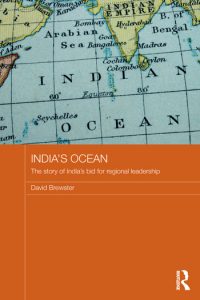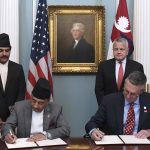
‘India’s Ocean- The Story of India’s bid for regional leadership’ by David Brewster is a masterpiece in the field of Indian Ocean Region (IOR) literature. The substance of the book shows the author has done a very comprehensive and analytical study of the region and the role of the stakeholders in the region. The book is divided into 11 chapters, each with its own unique theme, which makes it easier for the reader to comprehend and grasp the dynamics of the region.
‘Whoever controls the Indian Ocean dominates Asia. This ocean is the key to the Seven Seas.’ The repetition of this idea throughout the book constantly reminds the reader about the commercial and strategic importance of the Indian ocean. The author is a lawyer who has written extensively and tirelessly on India’s international relations. Through this book, he aims to inform his readers about the feasibility and reality of India’s stakes in the Indian Ocean Region. He further goes on to examine the internal factors and external influences which affect ‘India’s bid for regional leadership’.
The author has attempted to put the overall picture of the IOR in a very simple and understandable way. His attempt to deconstruct each and every aspect of the region is truly commendable. He starts by explaining the geographical dimensions of the Indian Ocean. He then talks about the shifting focus of the nations at two levels- from the Atlantic Ocean to the Indian Ocean and from land limited strategies to maritime prowess plans. Brewster further dives deep to identify the stakeholders of the IOR and describes the stakes of nations like the USA, China, India, etc.
After putting the picture unbiasedly and assessing India’s material resources and gains, he puts all the resources that India possesses against their utility (which comes from putting them at work). One of the major questions which Brewster addresses is ‘…whether, as India’s economic and military capabilities grow, it will seek to create an extended sphere of influence in the Indian Ocean. This book considers whether India has the ideological and material resources to build a hierarchical system in the Indian Ocean, and will consider what such a system might look like.’ He stresses the fact that since the discovery of the Indian subcontinent by Portuguese traveler Vasco da Gama, the Indian Ocean has been subjected to the domination of foreign powers and not the littoral states. This brings out the paradox between the name of the ocean and the real picture. The reasons he states for this are colonialism and associated supremacy of the west and lack of interests of littoral states in making it as a ‘region’ along with the absence of material, strategic and diplomatic resources with them, the second being the corollary of the former.
He majorly focuses and analyses on India’s potential and ‘destiny’ in the region to become a dominant power. India’s lack of attention towards the region for a long time or maybe incapacity can be considered as latent threads running throughout David’s work. For a considerable period of time after India’s independence, the country focused on strengthening and consolidating its land borders against Pakistan, China, and other insurgent groups. Being occupied with them, India did pay adequate attention towards its naval power and as a result, during the cold war, the US jumped to control especially the southwest part of the region. David observes that the Indian navy’s attempt to come up with its own strategy and doctrine, though welcomed in many respects, had little meaning in the absence of a national security strategy from the Indian government.
The author suggests India make friendly relations with nations like Indonesia, South Africa, Sri Lanka, Maldives, and Seychelles, just like the US did in the past, to establish Indian domination in the region. He talks about Indians, especially in New Delhi, who feel that the Indian ocean is very much an intrinsic and implied part of India and quotes K.M. Pannikar, ‘…to India, it is the vital sea…the Indian Ocean must therefore remain truly Indian…’ to capture the popular perspective towards the ocean. Even the title, ‘India’s Ocean’ says it all. Nevertheless, the author slowly and calmly describes the steps and threats which India might face before associating the ocean’s identity with itself. The biggest opposition to India’s bid is China which does not even consider Indian claims just because of the commonality of the name, though it recognises India’s stakes. One of the major misconceptions that the author clears out is that China’s economic partnerships with many island states in the Indian ocean do not always have a military extension. It only implies furthering China’s commercial and economic interests. He has critically examined China’s naval power and exposed the country’s disadvantage in the IOR and overhyped strategy of String of Pearls.
His in-depth study on the Indian Ocean Region unveils the region’s importance even for distant nations like the US which found it as a gateway for invading Iraq and Afghanistan. Even small nations like Mauritius, Seychelles, Maldives, Sri Lanka, and other south-east Asian nations are using the Indian Ocean to fulfill their domestic needs (economically and strategically) by switching between India and China, the two emerging powers in the region, making it complex for India to attain goodwill even from a single important player. In David’s viewpoint, the second opposition comes from the USA. He accepts that the US wants India to be a powerful nation in the region which it can pit against China but it will only support India’s candidature till the nation does not go against its interests. Moreover, the US has encouraged India’s rising power in all the pockets of the IOR except southwest where it has its own dominance. The US along with Japan is creating false hopes and narratives by recognising India as a future leader in the region only to fulfill their own ambitions of countering China’s rise. He cautions India against all this and advices to make strong friends in the region who can support its candidature for regional (subsequent global) power in the region against the dominance of China and interests of the US.
While reading the history, actors, relationships, strategies, and political vulnerabilities of the region in these 11 chapters one might feel that it might be too late for India to establish itself in the IOR as a regional and subsequent world power. In the climax Brewster unveils the growing economy of China and its economic relations with different minor nations of the region to point out the difference between India’s actual and assumed position. He brings to the surface the different roles India has assumed for itself in the region but without any intention or action. He claims that lack of realism and over-abundance of idealism affects India’s capability to make any gains by using its resources, which in turn bows down the country’s diplomatic achievements and strategic planning. However, being hopeful, he opines that the most cost-effective way to establish its hegemony in the region for India is to take aid from great powers, especially the US to strengthen its roots to become indispensable.
The book is a very interesting read for IOR and Indian foreign relations enthusiasts. The language is simple and easy to comprehend with hidden humor in some places. Published in 2014, this book synchronizes well with today’s today’s reality. The author has also made sure to put his ideas clearly by supplementing the texts with maps so that the reader can easily make sense of the realities. Descriptive and majorly focusing on the hard power, this book is a wonderful insight to understand the equations in the Indian Ocean Region.















